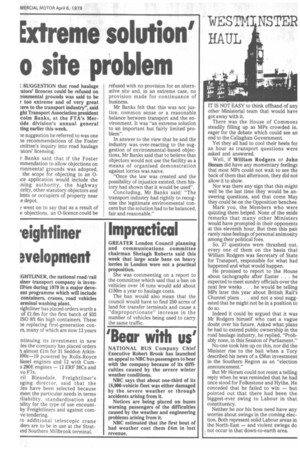Extreme solution' o site problem
Page 7

If you've noticed an error in this article please click here to report it so we can fix it.
7, SUGGESTION that road haulage .ators' licences could be refused on ronmental grounds was said to be r too extreme and of very great :.ern to the transport industry", said ght Transport Association president colm Banks, at the FTA's Meraide division's annual general ting earlier this week.
le suggestion he referred to was one le recommendations of the Foster imittee's inquiry into road haulage .ators' licensing.
r Banks said that if the Foster mmendation to allow objections on ronmental grounds was adopted, the scope for objecting to an 0ice application would include the ifling authority, the highway ority, other statutory objectors and lents or occupiers of property near Le depot.
went on to say that as a result of e objections, an 0-licence could be refused with no provision for an alternative site• and, in an extreme case, no provision made for continuance of business.
Mr Banks felt that this was not justice, common sense or a reasonable balance between transport and the environment. It was "an extreme solution to an important but fairly limited problem".
In answer to the view that he and the industry was over-reacting to the suggestion of environmental-based objections, Mr Banks said that to believe that objectors would not use the facility as a means of organised demonstration against lorries was naive.
"Once the law was created and the possibility of injustice existed, then history had shown that it would be used".
Concluding, Mr Banks said: "The transport industry had rightly to recognise the legitimate environmental concern but the solution had to be balanced, fair and reasonable."




































































































































































